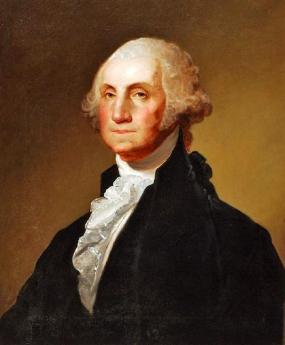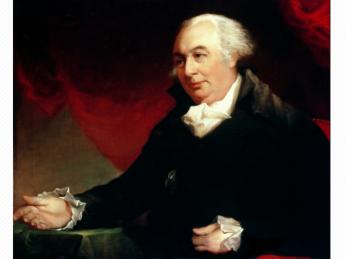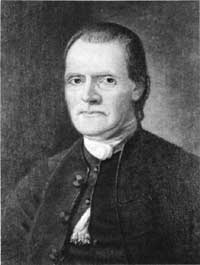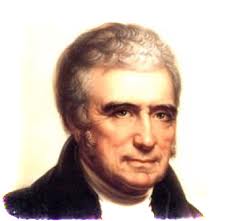Related Topics
...Authorship of the Constitution
There were seventy invited delegates to the Constitutional Convention. Fifty-five attended the sessions, and thirty-nine signed it. We believe the main contributions were made by seven or eight men. But you can never tell, for certain.
Personalities Who Wrote the Constitution
The windows of Independence Hall were nailed shut and the delegates to the Convention sworn to secrecy. James Madison kept the official minutes and only released them years later. We may never be certain who was responsible for every feature, particularly the parts devised at home or in neighboring taprooms. That's the way they wanted it to be, however.
We easily notice the most influential men in each state were selectively chosen to attend, but it is hard to say whether that was done to increase the chances of state ratification, or whether it was intended to "stack" the votes in favor of rich and powerful. Perhaps some of both motives played a part, but primarily George Washington had state ratification in mind. As matters turned out, class frictions were more pronounced during and after the ratification than they were when the delegates were chosen. The Constitution encouraged the rise of the common man far more quickly than was anticipated. Almost every feature of the Constitution was considered for its effect on state ratification, whereas redistributionist ideas were largely unmentioned in the surviving records.

|
| George Washington |
Although many patriots had similar feelings, George Washington stands above all others as the driving force behind calling the Convention. The experiences of seeing Congress reluctant to pay starving troops who had saved the nation, and the resulting mutinies, were almost too much for him to bear, and would have driven many other commanders to far more extreme actions in his place. James Madison, a generation younger than Washington, felt almost as strongly but could never have brought the Convention around to proposing a whole new structure of government. Washington needed a younger man to be his agent and picked this one out as the jockey for his racehorse. Washington wanted to preside and to glower at anyone who seemed to be saying the wrong things. Perhaps at some critical moment, his active intervention might save the day; he wanted to preserve that opportunity. Furthermore, Washington had not gone to college and felt he needed a scholar to suggest what the Greeks and Romans had done in similar circumstances. Particularly the Romans, whom Washington greatly admired.
Madison was short and socially awkward, still unmarried at age 36, much in awe of the towering General with his commanding demeanor. In spite of their obvious differences, they were both rich Virginia slave-holding planters; each regarded the other as the right sort. Madison was a Princeton graduate, in the days when that exposed him to Quaker beliefs and to teachers who had been prominent in the Scottish enlightenment. At that time, Virginia was by far the largest state, West Virginia and Kentucky had not yet been split off, and Virginia still held viable claims to the five states which were to become the Northwest Territory. Virginia firmly believed it had a right to run things in America.
.jpg)
|
| Alexander Hamilton |
Alexander Hamilton had been Washington's chief aide during the Revolution; their only conflict had been his demand to be released from headquarters duty to expose himself to the enemy in a flamboyant manner on the parapets of Yorktown. Hamilton the sharp-nosed little elf was a ladies man, to put it mildly. Even Martha Washington giggled about his behavior at parties. The New York delegation was split with divisions, and often Hamilton was the only New York delegate present at the Convention. It was usually quite enough. He organized the New York Federalist party and the Bank of New York seems to run around and be everywhere at once. In some ways, he was to Robert Morris what Madison was to Washington. That's where he got his financial ideas, but without need for encouragement, he ran around and got a million things done. There are portraits of him, but his real likeness is best captured in action by the elfin statue of him in Philadelphia's Constitution Center.
.jpg)
|
| Robert Morris Jr. |
Robert Morris Jr. was one of the richest men in America. Living near the waterfront of Philadelphia in a mansion, one of several he owned, Morris had arrived as a ten-year-old orphan and soon became a partner of the richest Quaker merchant by his astonishing energy and brilliance. When revolution had been proposed, Morris declared he was entirely satisfied with a king, but soon signed Thomas Jefferson's Declaration of Independence, and devastated the British merchant marine with his privateers and gunpowder smuggling in conjunction with the French playwright Beaumarchais, an equally remarkable man on the other side of the Atlantic. By the time of the battle of Trenton, Morris was essentially running the entire American government. He threw out the committee system and instituted the departmental bureaucratic system now still in use, all within a week of taking office. When the amateur Pennsylvania legislature created devastating inflation of paper money, leading to riots in the streets of Philadelphia, Morris brought the inflation to a halt by offering to finance the Revolution out of his own pocket. Living next door to George Washington, they became fast friends. Morris founded the first bank, selling bonds instead of using deposits, and then the second bank, using deposits in a modern way. He was much taken by Adam Smith and gave copies of The Wealth of Nations to influential friends. He engaged in a lively correspondence with Necker the French financier, which was cut off by Necker's death but probably formed the basis for what is now known as Hamilton's financial plan for the nation. Morris, accused only of recklessness rather than dishonesty later went to debtor's prison, tainted with the really dishonest finances of his partners, Governor Mifflin and comptroller John Nicholson. Morris repaid nine of the twelve million dollars he owed before being released by changes in the Bankruptcy Law which he suggested while in jail. During the Constitutional Convention, he seldom made a speech but was continually seen ducking in and out of conferences which very likely improved the future of the nation. With Washington running the Army and Franklin running the diplomatic mission in Paris, Morris is one of the three men about whom it can be said the Revolution could not have been won without him.

|
| Gouverneur Morris |
And finally, Gouverneur Morris, as "Lord of the Manor" the only titled aristocrat at the Convention, going back several generations before the English settlement of America. Morris was displaced by the British occupation of New York and became Robert Morris' lawyer. He was as tall as George Washington, but had both an arm and a leg badly injured in accidents; somehow, his many lady friends found it enhanced his attractiveness. Gouverneur is referred to as the "Penman of the Constitution", actually the editor.

|
| Roger Sherman |

|
| Benjamin Franklin |
So there you have the authors we can identify. It would be astonishing if Benjamin Franklin could sit there for months without saying a word, and he probably didn't. That old fox was in the habit of placing his words in the mouth of someone else so he could maneuver around any opposition. And he certainly waited until the last moment of hesitation, urging his colleagues to doubt their infallibility a little, and vote for the best they could probably produce.

|
| John Marshall |
Originally published: Tuesday, June 26, 2012; most-recently modified: Friday, May 31, 2019